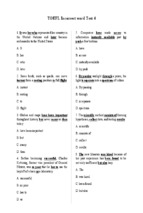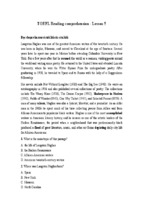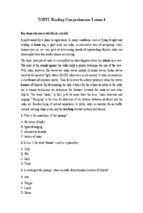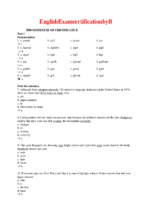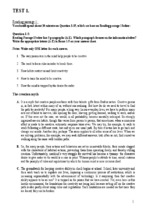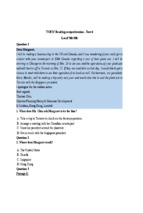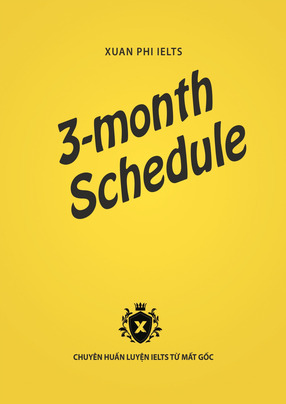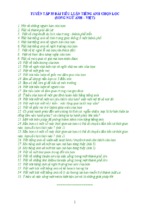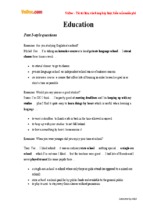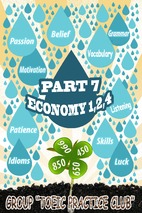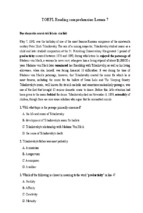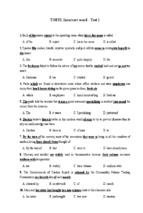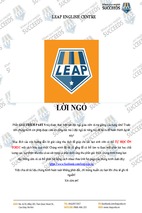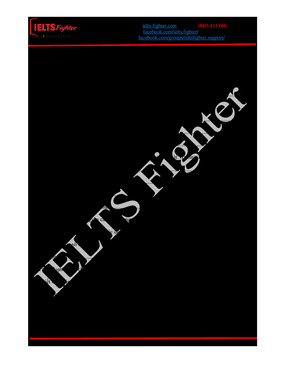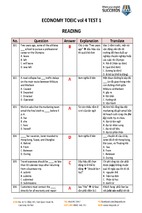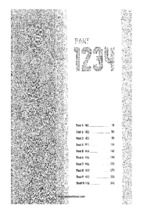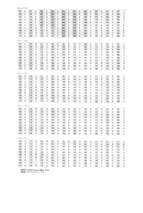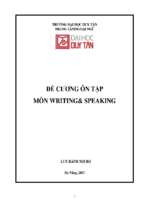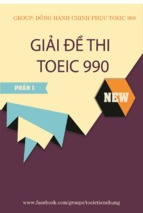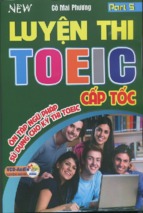Practice Test Two
Candidate Name _________________
INTERNATIONAL ENGLISH LANGUAGE TESTING SYSTEM
LISTENING SECTION
TIME: 30 MINUTES
INSTRUCTIONS: You must not open the booklet until you are instructed to do so. Write your name and
registration number at the top of the page. You should attempt all questions. All recordings will be
played only once. Write all your answers on the test paper itself. After the section is over, you will be
given ten minutes to transfer your answers to the given answer sheet. You are not permitted to take this
exam booklet out of the examination room.
There are 40 questions in this section. They are broken up into four parts as follows:
Section 1
Section 2
Section 3
Section 4
Questions 1-10
Questions 11-20
Questions 21-30
Questions 31-40
Test 2
LISTENING
SECTION 1
Questions 1-10 (CD3 Track 1)
Questions 1-2
Choose the correct letters, A, B, or C.
Example:
What nursery school registration option does the woman choose?
A Half-day
B Full-day
C Full-day plus after school care
1 What is the woman’s husband’s nationality?
A Swiss
B Swedish
C Swazi
2 How is a child’s personal education number normally received?
A By post
B By e-mail
C Picked up from the school
Question 3
Choose the correct letters, A, B, or C.
3 Why is the husband out of town?
A Vacation
B Work
C Family reasons
Question 4
Choose three letters, A-F
4 Which THREE pieces of information are required to retrieve the child’s personal
education number?
A The woman’s Personal Insurance Number
B The husband’s Personal Insurance Number
C The woman’s National Insurance Number
D The husband’s National Insurance Number
E The woman’s name
F The husband’s name
Question 5
Choose the correct letters, A, B, or C.
5 How is the husband’s name spelt?
A Erick
B Eric
C Erik
Questions 6-7
Choose the correct letters, A, B, or C.
6 What is Matilda’s Personal Education Number?
A T56340192
B P56340192
C T56P40192
7 Where was the child born?
A Newcastle
B London
C Monterey
Question 8
Choose two letters, A-F
8 What TWO qualifications do many of the nursery school’s senior staff have?
A One year diploma
B Two year diploma
C Three year diploma
D Master’s degree
E Bachelor’s degree
F Doctorate degree
Questions 9-10
Complete the notes below. Write NO MORE THAN TWO WORDS AND/OR A NUMBER for
each answer.
First day of class: 9…………..
Orientation day: 3 September.
Orientation hours: 9:00 to mid-day.
10…………. and children should attend orientation.
SECTION 2
Questions 11-20 (CD3 Track 2)
Questions 11-13
Complete the table below.
Write NO MORE THAN TWO WORDS AND/OR A NUMBER for each answer.
University opened
11………..
1745 - 1805
Shut down
1805-1815
12………. buildings constructed
In the past 13……… years
Seven buildings constructed
Question 14
Choose the correct letters, A, B, or C.
14 The Prescott Building has which layout?
A
B
C
Question 15
Write NO MORE THAN TWO WORDS AND/OR A NUMBER for each answer.
15 How many years ago were the Persian carpets donated?
_______________________________
Question 16
Choose the correct letters, A, B, or C.
16 What discount do students receive at the local pub?
A 30%
B 40%
C 3%
Questions 17-20
Complete the summary.
Write NO MORE THAN TWO WORDS AND/OR A NUMBER for each answer.
In front of the library, there is a beautiful 17……… Inside the library, the ground floor has
18………. books. The upper floors, however, house over 3,000,000 books. The collection was
built by donations, gifts and university purchases. Additionally, there is a 19……….. area, with
works dating back to 1588. There are many sporting facilities, including the rugby field, which is
home to the rugby team which has won three of the past five 20………….
SECTION 3
Questions 21-30 (CD3 Track 3)
Questions 21-23
Write NO MORE THAN TWO WORDS AND/OR A NUMBER for each answer.
21 If an Egyptian’s income was 10 000, how much would be given to the pharaoh?
__________________________
22 The first reason mentioned for taxes is __________________
23 The second reason for taxes, known as ____________, takes money from the rich and gives it
to the poor.
Questions 24-26
Complete the flow chart.
Write the correct letter, A-F, next to questions 24-26.
Product
25…………………
24………………..
Subject to
26………. Tax
Allowed to go
to free market
A Revenue
B Alcohol
C Redistribution
D Repricing
E General goods
F Production
Questions 27-29
Which THREE of the following are arguments given in favour of lower taxes?
Write the THREE correct letters, A-F, next to questions 27-29 (in any order).
A It is easier to make money when you are already rich.
B Businesses will leave the country if taxed too harshly.
C Inheriting money requires no hard work.
D A country must be able to stay competitive in the global market.
E A worldwide tax structure can be implemented.
F Lower taxes, in the end, end up benefitting everyone, including the poor.
Question 30
Choose the correct letters, A, B, or C.
30 What do the speakers believe about taxes in the future?
A They will stay relatively the same.
B They will be lower.
C They will be higher.
SECTION 4
Questions 31-40 (CD3 Track 4)
Questions 31-33
Complete the flow chart below.
Write NO MORE THAN TWO WORDS AND/OR A NUMBER for each answer.
Isaac Newton born, 1643.
↓
Studies at the King’s School in Grantham from the age of
31………………… to ……………….
↓
Leaves school, mother attempts to make him a 32………………
↓
1661, on the recommendation of his teachers, admitted to Trinity College in Cambridge. Six
years after beginning, Newton becomes a 33………………………….. there.
Questions 34-37
Choose your answers from the box and write the letters A-D next to questions 34-37.
NB
You may use any letter more than once.
A Galileo
B Newton
C Descartes and Leibniz
D Einstein
34 Believed that planets moved in an ether ……
35 Developed a theory which was thought to “replace” the earlier theory of gravity ……
36 In the “experiment of the mind”, tells us the billiard ball is “smooth” ……
37 Used not mirrors, but lenses in the construction of the telescope ……
Questions 38-39
Write NO MORE THAN TWO WORDS AND/OR A NUMBER for each answer.
Telescopes with lenses cannot be built as large as telescopes with mirrors because large lenses
tend to 38………………………………… Telescopes with mirrors take up less space because of
their reduced 39……………………….
Question 40
Choose the correct letter, A, B, or C.
40 Which statement is true?
A Newton and Leibniz discovered calculus together
B Newton and Leibniz discovered calculus separately, during the same time period
C Newton and Leibniz discovered calculus separately while working at the same
university
Practice Test Two
Candidate Name __________________
INTERNATIONAL ENGLISH LANGUAGE TESTING SYSTEM
READING SECTION
TIME: 60 MINUTES
INSTRUCTIONS: You must not open the booklet until you are instructed to do so. Write your name and
registration number at the top of the page. You should attempt all questions. Write all your answers on
the answer sheet provided. You are not permitted to take this exam booklet out of the examination
room.
There are 40 questions in this section. They are broken up into three parts as follows:
Reading Passage 1 Questions 1-12
Reading Passage 2 Questions 13-26
Reading Passage 3 Questions 27-40
READING
READING PASSAGE 1
You should spend about 20 minutes on Questions 1-13, which are based on Reading Passage 1.
(Reading Audio – CD3 Track 5)
Tristan da Cunha
An Island of Remote Curiosity
A
Tristan da Cunha is an island in the South Pacific Ocean, formed by volcanic activity,
and part of the British Overseas Territory called Saint Helena, Ascension and Tristan da Cunha.
Tristan da Cunha is generally considered to be the most remote inhabited place on Earth.
Because of its extreme isolation, and its small population, Tristan da Cunha is a fascinating
‘experiment’ in sociology and genetics.
B
The island was first discovered in 1506 by a Portuguese explorer named Tristao da
Cunha, who named the island after himself. The name of the island was later anglicized by the
inhabitants into Tristan da Cunha. In 1816, the United Kingdom annexed the island, taking
control of it. They used it as a marine military base for a number of decades in the 19th century,
before it fell into disuse after the construction of the Suez Canal. The Second World War,
however, brought renewed purpose to the island. It was used as a top secret British naval
station, codenamed HMS Atlantic Isle. The purpose of the station was to monitor the waters
for German U-boats.
C
According to a recent census, the island has a population of just 263 people, who mainly
reside in the settlement known as ‘Edinburgh of the Seven Seas’. It is thought that the
residents of the island descend from just fifteen ancestors, of which eight were male and seven
were female. Because the reproduction pool is so small, the residents of the island suffer from
a number of medical disorders. There is rampant asthma on the island, which is thought to be a
result of the known fact that three of the original founders of the island suffered from asthma.
Based on the endemic asthma afflicting inhabitants of the island today, it is thought that there
is a genetic underpinning for the condition. Further evidence comes from islanders commonly
suffering from glaucoma, a degenerative eye condition which, left untreated, can result in
blindness.
D
There are just eight surnames among the 263 residents of Tristan da Cunha,
corresponding roughly to the eight original male ancestors. Since there is almost no
emigration to the island, the surnames are kept intact for many generations.
E
Education on the island is very limited. Children only attend school until the age of
fifteen, with the option of taking the British standardized test for secondary school graduates,
once they have completed schooling. As a consequence of the low quality of education,
standardized test scores are generally very poor. Another indication of the island’s remoteness
and relative lack of contact with the outside world is that the English spoken among its natives
is very different from that spoken in the rest of the world.
F
Arguably, one of the most interesting facts about Tristan da Cunha was that until the
aftermath of the Second World War, the only currency in place was the potato. For example,
the newspaper The Tristan Times, could be purchased for four big potatoes. Today Tristan da
Cunha uses the British pound as its currency, which is odd, because neighbouring Saint Helena
(2,173 km away), of which Tristan da Cunha shares its status as a British Overseas Territory,
uses the Saint Helena pound and not the British pound. Since Tristan da Cunha was formed by
volcanic activity, and the volcano which formed it is still active, the inhabitants of the island live
in constant danger of volcanic eruption. The last such eruption occurred as recently as 1961,
when all of the islanders had to be evacuated to England. While some communities around the
world participate in fire, earthquake or tornado drills, the residents of Tristan da Cunha
participate in evacuation drills, where they practise the protocol for evacuation of the island in
case of volcanic eruption.
G
The Tristan economy is built mainly upon farming. All land is owned by the community,
that is to say there is no individual land ownership. Another significant part of the economy is
the exportation of crayfish and lobster, mainly to Japan and the United States. A fire that
occurred in 2008 greatly affected both the domestic and export economies. Tristanians are a
fiercely proud and independent people; even when given the choice to stay in England after
exile due to the volcanic eruption, almost every resident returned to the island.
Questions 1-5
Reading Passage 1 has seven paragraphs, A-G.
Which paragraph contains the following information?
Write the correct letter in boxes 1-5 on your answer sheet.
1 The different types of money used on the island
2 Exam results of Tristan students
3 Discussion of the original inhabitants of the island
4 The island as an armed forces outpost
5 Geography of the island
Questions 6-11
Match the following places with facts about them from the passage.
Write the correct letter, A-D, in boxes 6-11 on your answer sheet.
NB
You may use any letter more than once.
A
Saint Helena
B
Tristan de Cunha
C
United Kingdom
D
Portugal
6 Took political control of the island in the 19th century
7 Uses its own currency
8 Home to “Edinburgh of the Seven Seas”
9 Origin of the name “Tristan de Cunha”
10 Islanders had to be evacuated here after a natural disaster
11 Discovered the island
Questions 12-13
Complete each sentence with the correct ending, A-E, below.
Write the correct letter, A-E, in boxes 12-13 on your answer sheet.
12 Because the number of people that move permanently to the island is so small,
13 Due to its remoteness, the dialect of Tristanians is
A last names remain the same for generations
B asthma is very rare
C very different from other variations of English
D continually developing
E often confuses to outsiders
READING PASSAGE 2
You should spend about 20 minutes on Questions 14-26, which are based on Reading Passage 2.
(Reading Audio – CD3 Track 6)
Questions 14-18
Reading Passage 1 has six paragraphs, A-F.
Choose the correct heading for paragraphs A- C, and E-F from the list of headings below.
Write the correct number, i-xi, in boxes 14-18 on your answer sheet.
List of Headings
i
ii
iii
iv
v
vi
vii
viii
ix
x
xi
14 Paragraph A
15 Paragraph B
16 Paragraph C
Example
Answer
Paragraph D vii
17 Paragraph E
18 Paragraph F
Reason as the basis for knowledge
The relation between reason and maths
The end goals of empirical pursuits
Is Socrates a man or a mortal?
Philosophy as the pursuit of knowledge and truth
Maths versus reason: the differences
Using the right tool
A central debate in education
The lack of practicality as philosophy's downfall
The value of education in practice
Purity as beauty
WHY STUDY
PHILOSOPHY?
There are two schools of thought when it comes to education. One side
believes that education should give students tools for success in life, while the
other side believes that education itself is an important goal. No area of study
brings this debate to a head more than the study of philosophy. Philosophy, for
those who belong to the practical side of the debate, is an utter waste of time.
Philosophy provides very few tools for success in life, they say. A common
question for someone studying philosophy is – “what are you going to do with
it?” Those on the other side of the debate – those who value education for
knowledge itself – can see that the study of philosophy has many important
benefits.
A
The word ‘philosophy’ derives from the Greek for ‘love of wisdom’. Just as
it was in Ancient Greece, it is those people who love wisdom, knowledge and
truth who study philosophy. However, we do not live in Ancient Greece, where
people had slaves to do all of their chores (such as working in the fields), so what
place does philosophy have in today’s society?
B
If philosophy teaches anything, it teaches the ability to reason. With
reason one can construct, analyze and find faults in arguments. For example, if
all men are mortal, and Socrates is mortal, is Socrates a man? What if we
change the question to: if all men are mortal, and Socrates is a man, is Socrates
mortal? Once a student is schooled in the ability to reason, he will see right
away that these two questions are very different. As it turns out, the first is an
invalid argument, while the second is very much valid. Perhaps the next
question of the skeptic is ‘what is the value of reason’? This is a very important
question – surely if philosophy is all about learning to reason, then an ability to
reason must be a valuable trait. Arguably the ability to reason forms the
foundation for all knowledge.
C
If an individual holds an opinion which is believed wrong or incorrect, it
could be important to convince them of the right opinion. There are a number
of ways to attempt this. They can be intimidated, belittled or bullied into
accepting the opposite opinion. However, having a strong opinion does not
D
mean the opinion is any more correct. Many people have strong opinions on all
manner of subjects but, of course, strength of feeling does not correspond to
validity, and it follows that someone who belittles another’s opinion is not
necessarily the one in the right. When two men engage in a fistfight over whose
opinion is correct, the winner of the fight may not have the correct opinion, but
merely the correct fighting technique. In any disagreement, the right tools must
be employed. In a battle of brawn, the tool is strength. In a battle of wills, the
tool is perseverance. In a battle of words, the tool is reason. When arguing with
reason, facts of the matter are stated and conclusions are drawn from those
facts accordingly.
Reason is fundamental to almost every intellectual endeavour one can
imagine, just as mathematics is fundamental to almost every scientific
endeavour. Maths is the language of science just as reason is the language of
discourse and debate. Accordingly, just as society needs experts in
mathematics, so society needs experts in reason. The argument should follow
that as we all learn mathematics as children and young adults, so we should
learn the precepts of reason.
E
Above all, philosophy is pure. Certainly reason is useful in all areas of life,
but that does not mean that philosophy’s value lies only in its usefulness in the
day-to-day. Philosophy is the pursuit of knowledge for the sake of knowledge.
There is a beautiful human quality expressed in this. Every other academic
discipline is knowledge for some empirical pursuit. For example, engineering is
knowledge so that we can construct buildings, chemistry is knowledge so that
we can make drugs, and biology is knowledge so that we can stay healthy.
Philosophy has no tangible outcome outside of the pure pursuit of knowledge.
The only other discipline which comes close in this regard is mathematics. One is
purity in numbers, and the other is purity in words.
F
- Xem thêm -

